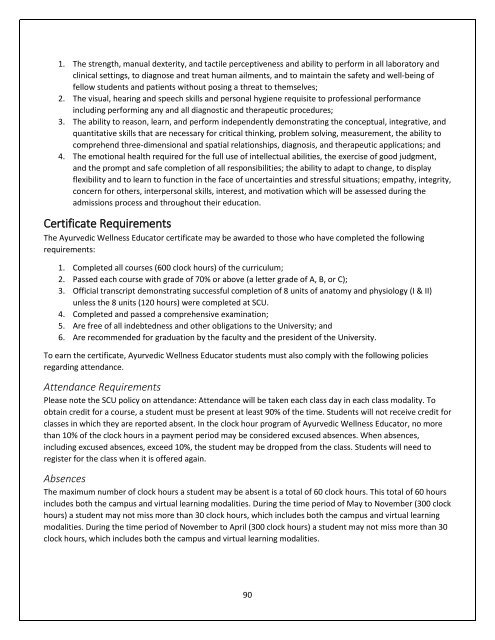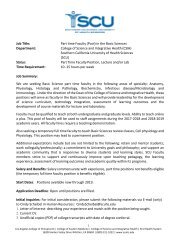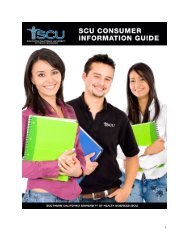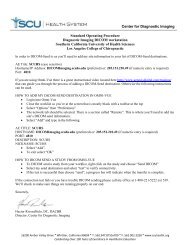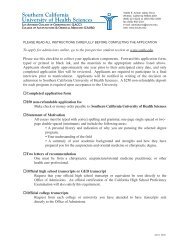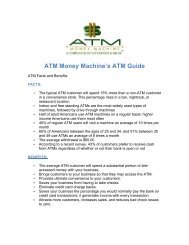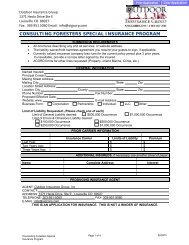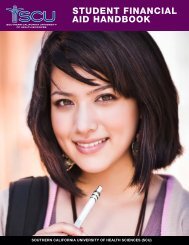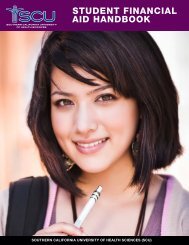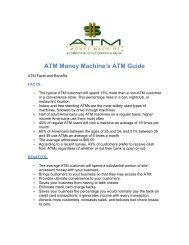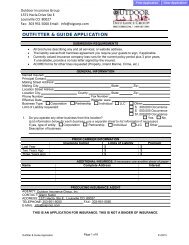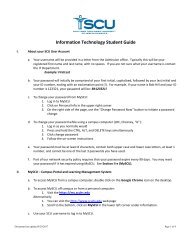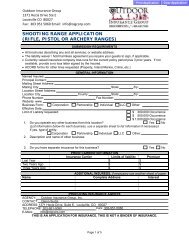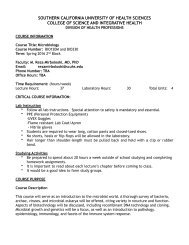Vision, Mission, and Guiding Principles for SCUHS
Southern California University of Health Sciences will be recognized as the premier evidence-based integrative healthcare university. in this PDF we are discussing about our Vision, Mission, and Guiding Principles. Please have a look. you can also go with this link: https://bit.ly/2JuIItL
Southern California University of Health Sciences will be recognized as the premier evidence-based integrative healthcare university. in this PDF we are discussing about our Vision, Mission, and Guiding Principles. Please have a look. you can also go with this link: https://bit.ly/2JuIItL
You also want an ePaper? Increase the reach of your titles
YUMPU automatically turns print PDFs into web optimized ePapers that Google loves.
1. The strength, manual dexterity, <strong>and</strong> tactile perceptiveness <strong>and</strong> ability to per<strong>for</strong>m in all laboratory <strong>and</strong><br />
clinical settings, to diagnose <strong>and</strong> treat human ailments, <strong>and</strong> to maintain the safety <strong>and</strong> well-being of<br />
fellow students <strong>and</strong> patients without posing a threat to themselves;<br />
2. The visual, hearing <strong>and</strong> speech skills <strong>and</strong> personal hygiene requisite to professional per<strong>for</strong>mance<br />
including per<strong>for</strong>ming any <strong>and</strong> all diagnostic <strong>and</strong> therapeutic procedures;<br />
3. The ability to reason, learn, <strong>and</strong> per<strong>for</strong>m independently demonstrating the conceptual, integrative, <strong>and</strong><br />
quantitative skills that are necessary <strong>for</strong> critical thinking, problem solving, measurement, the ability to<br />
comprehend three-dimensional <strong>and</strong> spatial relationships, diagnosis, <strong>and</strong> therapeutic applications; <strong>and</strong><br />
4. The emotional health required <strong>for</strong> the full use of intellectual abilities, the exercise of good judgment,<br />
<strong>and</strong> the prompt <strong>and</strong> safe completion of all responsibilities; the ability to adapt to change, to display<br />
flexibility <strong>and</strong> to learn to function in the face of uncertainties <strong>and</strong> stressful situations; empathy, integrity,<br />
concern <strong>for</strong> others, interpersonal skills, interest, <strong>and</strong> motivation which will be assessed during the<br />
admissions process <strong>and</strong> throughout their education.<br />
Certificate Requirements<br />
The Ayurvedic Wellness Educator certificate may be awarded to those who have completed the following<br />
requirements:<br />
1. Completed all courses (600 clock hours) of the curriculum;<br />
2. Passed each course with grade of 70% or above (a letter grade of A, B, or C);<br />
3. Official transcript demonstrating successful completion of 8 units of anatomy <strong>and</strong> physiology (I & II)<br />
unless the 8 units (120 hours) were completed at SCU.<br />
4. Completed <strong>and</strong> passed a comprehensive examination;<br />
5. Are free of all indebtedness <strong>and</strong> other obligations to the University; <strong>and</strong><br />
6. Are recommended <strong>for</strong> graduation by the faculty <strong>and</strong> the president of the University.<br />
To earn the certificate, Ayurvedic Wellness Educator students must also comply with the following policies<br />
regarding attendance.<br />
Attendance Requirements<br />
Please note the SCU policy on attendance: Attendance will be taken each class day in each class modality. To<br />
obtain credit <strong>for</strong> a course, a student must be present at least 90% of the time. Students will not receive credit <strong>for</strong><br />
classes in which they are reported absent. In the clock hour program of Ayurvedic Wellness Educator, no more<br />
than 10% of the clock hours in a payment period may be considered excused absences. When absences,<br />
including excused absences, exceed 10%, the student may be dropped from the class. Students will need to<br />
register <strong>for</strong> the class when it is offered again.<br />
Absences<br />
The maximum number of clock hours a student may be absent is a total of 60 clock hours. This total of 60 hours<br />
includes both the campus <strong>and</strong> virtual learning modalities. During the time period of May to November (300 clock<br />
hours) a student may not miss more than 30 clock hours, which includes both the campus <strong>and</strong> virtual learning<br />
modalities. During the time period of November to April (300 clock hours) a student may not miss more than 30<br />
clock hours, which includes both the campus <strong>and</strong> virtual learning modalities.<br />
90


